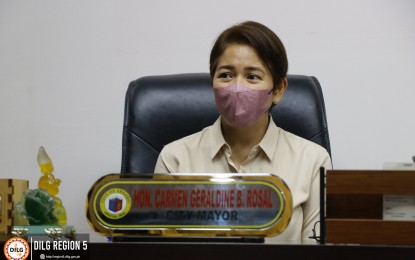
Legazpi City Mayor Carmen Geraldine Rosal (File photo courtesy of DILG Region 5)
MANILA – The Commission on Elections (Comelec) Second Division has granted the petition to disqualify Legazpi City Mayor Carmen Geraldine Rosal from the May 2022 elections for violating a provision of the Omnibus Election Code (OEC) on the disbursement of public funds during the election period.
In a 19-page resolution promulgated on Tuesday, the division ruled in favor of the petition of Joseph San Juan Armogila, who ran for councilor but lost in the last polls, to disqualify Rosal from the mayoralty race.
The petition filed on April 12 seeks to disqualify the respondent and that her proclamation be suspended and/or deferred until such time that the Commission renders final judgment.
Armogila alleged that Rosal released cash assistance amounting to PHP2,000 to tricycle drivers and senior citizens during the campaign period, thus, violating the prohibition on release, disbursement, and expenditure of public funds.
The petition stemmed from a Facebook post of one Al Barizo, a candidate for city councilor in the same city, announcing his gratitude for the support they received from their local government, including the respondent.
As for the allegation of vote-buying, the poll body said it did not see any reason for Rosal to be accountable for such a violation.
“Although what we deal in this case is the electoral aspect of vote-buying where mere substantive evidence is required, still, if the evidence presented to support the claim falls short to satisfy the quantum of evidence, the court, tribunal or quasi-judicial body has no resort but to dismiss the same. As a matter of fact, resort to technical rules of evidence is not even rigorously applied in this case. But when the Petitioner fails to satisfy the burden of proof by mere substantial evidence, We will not tip the scale of justice in his favor,” it said.
“All told, We do not see it fit to hold Respondent accountable for vote-buying, punishable under Section 261 (a) of the Omnibus Election Code (OEC) as a ground to have her disqualified,” the poll body added.
Section 261 of the OEC prohibits the release of expenditure of public funds during the 45-day period before election day.
Rosal, however, maintained that the cash assistance is a continuing project under the Department of Social Welfare and Development (DSWD) and is not covered by the prohibition.
She added that the activity was reported to the Commission on Audit.
“The exemption from the prohibition as regards continuing programs/ projects only applies to public works as expressly declared in the last paragraph of Section 261 (v)(1) but not to social services and development. In support thereof, Respondent raised her Second defense and that is, the subject projects were duly reported to the Commission on Audit pursuant to Item 2.1 of its Circular No. 2013-004 dated 30 January 2013. However, for purposes of defining the prohibited act of Illegal Disbursement of Public Funds, the report to the Commission on Audit is immaterial. It is the act itself and the time when it was committed that serve as the moving factor to hold the culprit liable,” it added.
The Second Division also noted that the respondent should be held liable for violating the OEC even as she was only a candidate at that time.
“Evidently, it was established that Respondent appears to have benefited from the Local Government Unit's project where public funds were definitely released, disbursed, and spent to sponsor the cash pay-out or assistance to the tricycle drivers and senior citizens. Again, it is the mindset that culminated in the minds of the Petitioner, his witnesses, and the public in general that became the turning point. There is the presence of vital components in this case: (1) the project; (2) individual cash pay-outs were distributed; (3) the project was attributed not only to the local government unit but to Respondent as well; and most importantly, she won,” it said.
“Again, whether this activity and Facebook shoutout made a huge contribution to her number of votes, there will always be material assumption. We cannot help but conclude that as far as the public in general is concerned, there is direct attribution to the Respondent of the cash pay-out masked as social welfare project,” the poll body added.
The resolution was signed by Second Division Presiding Commissioner Marlon Casquejo and Commissioner Rey Bulay. (PNA)
